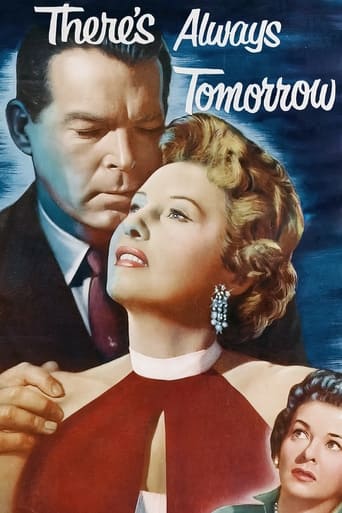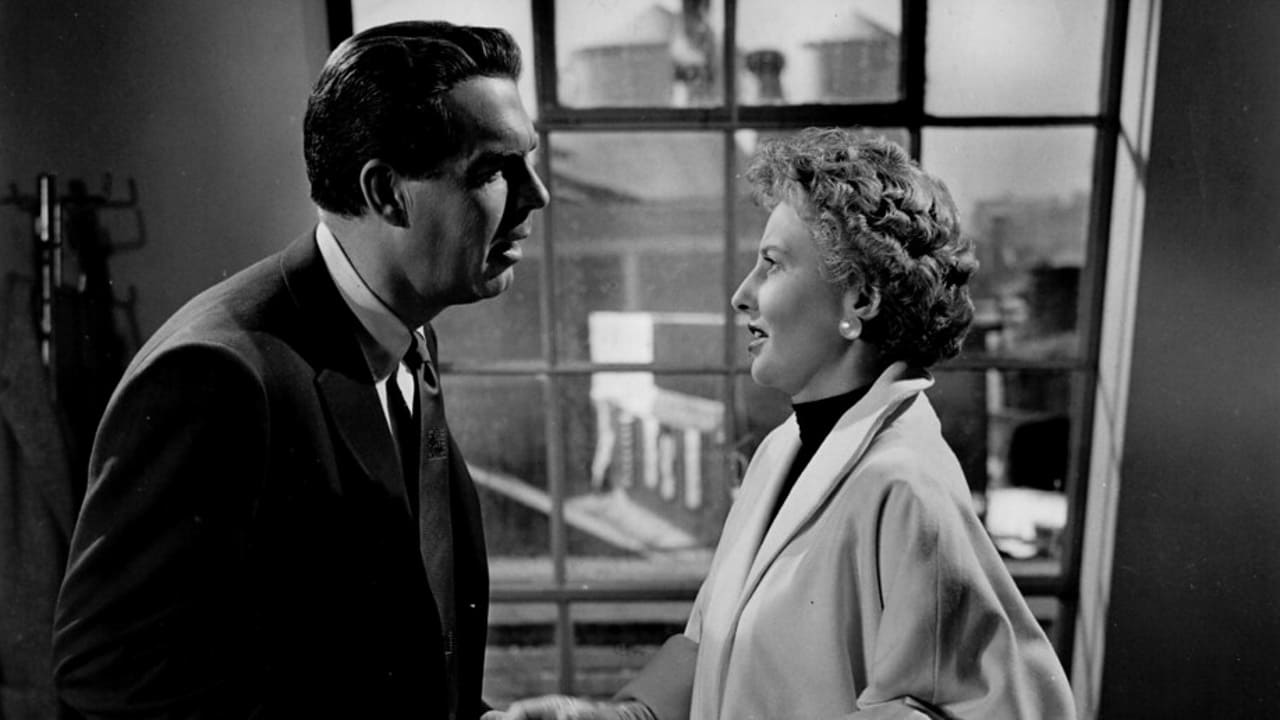Patricio García Martinez
In her review, at the time on the top of this movie's reviews, lora64 says: "As for first impressions, I have the feeling it's an idealist's wished-for 'dream of a perfect world and perfect people' that never quite comes true, unfortunately, for many in real life. " I think my dearest lora64 misunderstood the film. ANd I think many people misunderstands it. Because the one thing important nobody seems to see. I mean the robot. Unlike conservative Noel Coward's "Brief Encunter",this is the story of a little talking robot living a little idiotic life with his little idiotic family, as he LONGS for escape. Just see the many takes of the robot walking towards the camera. Douglas Sirk was trying to say something there.This film is bitterness and acidity combined in such a masterful way, and finely enough that a lot of people still think they're watching a 'dream of a perfect world and perfect people'.
keylight-4
Cliff Groves (Fred MacMurray), a toy manufacturer, has been married for about twenty years to Marian (Joan Bennett), who now takes him for granted and gives most of her attention to their demanding children, leaving Cliff feeling unloved and unappreciated and ripe for an affair with old flame Norma Vale (Barbara Stanwyck), a successful fashion designer.I really enjoyed this movie, despite its somewhat heavy-handed depiction of Fred MacMurray's unhappy home life, and the casting of the awful Joan Bennett. Joan Bennett seemed near-comatose in every film I ever saw her in, with no more facial or vocal expression than a turtle. How did she ever get even one acting job? Barbara Stanwyck looked great, and Fred MacMurray was as attractive as ever. Ever notice what a good build he had? He was very athletic in his youth, and stayed in good shape. Joan Bennett, however, was the dullest actress in movie history. I don't approve of adultery, but I felt so sorry for Cliff, having that boring, dim-witted lump for a wife, and those thankless brats for children, that I wouldn't have blamed him if he had ditched them all for the glamorous yet down-to-earth Norma Vale. Marian lives only for her children, and when Cliff tries to talk to her about his loneliness and hurt at always taking second place to the kids, she makes light of his feelings with some condescending and witless comments that made me want to choke her.The scene where Cliff tries to get Norma to run away with him is well-written and believable. Norma, distraught, tells him they have to face reality, that he'll still want to see Marian (although why he would ever want to see Marian again escapes me), and that if he marries Norma, he would shame his family, be alienated from his children, etc., etc. The ending of this movie is very unsatisfying. Norma goes back to New York to her life and career, and we see her sitting alone on the plane, heartbroken & crying. Cliff gazes up from his living room window at Norma's plane flying overhead, then turns and walks away, at which point Marian materializes beside him and takes his arm, saying something like, "You haven't been yourself lately", to which Cliff replies, "I'm all right now". Then he tells Marian fondly, "You know me better than I know myself". WHAT??? Marian has been ignoring the poor man for years and is patronizing and totally insensitive to his feelings, but now we're supposed to believe that good ol' Cliff has come to his senses and all is well. I taped this movie off of AMC about ten years ago, and I remember the host of the show saying that originally, the movie did not include this preposterous, tacked-on ending. The emotional scene where Norma forces Cliff to face reality about the hopelessness of their situation was originally supposed to be the final scene, if I remember correctly. Norma flees, and Cliff is left standing alone and dejected in his office workshop, while in the foreground we see "Rex the Walkie-Talkie Robot Man" walking to the end of the table and falling off the end. Rex was the obvious symbol for Cliff. This ending was deemed too depressing, or something, so the writers were forced to add the ridiculous and false scene with Marian.Watch this movie when you get a chance, but try to picture somebody else in the Joan Bennett role.
graham clarke
Douglas Sirk is renowned for injecting his subversive criticism of American society of the fifties in his glossy and glamorous melodramas. What made this palatable to the public, who flocked in droves, was the fact that the families involved were showbiz families ("Imitation of Life"), filthy rich oil magnates ("Written in the Wind") or highly idealized to the point of caricature ("All that Heaven Allows", "Magnificent Obsession"), far from the average movie goers own social milieu. And of course up there on the screen were the glamorous stars, Rock Hudson, Lana Turner, Lauren Bacall, Dorothy Malone, etc. Movie fans will recall the aforementioned movies when the topic of Sirk's movies arises. It is highly unlikely that "There's Always Tomorrow" will get a mention. "There's Always Tomorrow" has barely any gloss or glamour. The social criticism is completely without disguise. The family in question is one that the vast majority of movie goers could very easily identify with. Its stars (Fred MacMurray and a not so young Barbara Stanwyk) are not glamorous. While audiences left the cinema entranced by the glorious melodrama of "Imitation of Life" and "Written on the Wind", they would have left "There's Always Tomorrow" feeling a lot less secure about their own lives, since it's a film that touches on a fair amount of "dangerous" territory, calling into question the very foundations of the American family. Douglas Sirk's sense of irony has never been sharper. The title brims with optimism and the film opens with the script, "Once Upon a Time in Sunny California". But what unfolds is a bleak, pessimistic depiction of middle class family life.While Sirk's films have often been branded "woman's pictures", "There's Always Tomorrow" is indeed very much a man's picture. It takes a hard and deep look at the role of the male breadwinner and the picture it comes up with is not a pretty one. What we are shown is a man who when young, courted the prettiest girl, married, had children and worked hard to build up a successful business. He is now middle aged and having achieved it all, begins to feel himself taken for granted by his wife and children. His needs are completely neglected. His wife has little interest in him sexually being totally wrapped up in fulfilling the unending needs of their self centered ungrateful children. It's a scenario all too familiar to millions of men. Fred MacMurrays's Clifford Groves has become a robot similar to the one his successful toy manufacturer has created. No wonder that Norma Vale's (Stanwyk) reappearance in his life presents an opportunity to regain his lost dreams. She's an independent career woman, who sees his situation as somewhat idyllic from the outside. But with the usual intelligence of a Stanwyk character, she has no illusions as to a possible future with him. Despite the brief and obligatory conciliatory ending, Clifford Groves' future does not bode well. It should come as no surprise that the film was not well received at the box office. "There's Always Tomorrow" has many of the hallmarks of Sirk's craftsmanship. The studio refused to grant him his request for the film to be shot in color, despite having provided Universal with some of its highest grossing pictures of the decade. At least his demand for his favorite cameraman Russell Metty was granted. Metty as always, was the perfect partner in realising Sirk's vision. His interior filming in particular is a lesson in cinematography. He had a penchant for shooting characters behind banisters, framed in mirrors and caged behind fences to enhance the sense of their being trapped. MacMurray and Stanwyk are constantly gliding through dark shadow and bright light reflecting the inherent brightness and darkness in their lives. At this point of writing "There's Always Tomorrow" has not been released in any format and rarely gets a showing on television. It's a gross injustice to an extremely important director and a wonderfully made, moving piece of cinema.
Jim West
Sirk aptly deals with basic family values and problems in a critical way, questioning the false appearance of stability and harmony of a typical American home. MacMurray's job in a toy factory provides plenty of interesting metaphors, often visual ones. In one scene Sirk even places 'Rex, the Walkie-Talkie Robot-Man' on the foreground, upstaging MacMurray and forcing a comparison between them. MacMurray's home, under the resemblance of a happy and harmonious family life, really seems like a big doll's house MacMurray being here a sort of male 'Nora'. The happy ending seems a bit awkward or phony, but it's what audiences were taught to expect back in the 50's; no other ending would have been allowed under the infamous Production Code, then still being enforced.


 AD
AD



